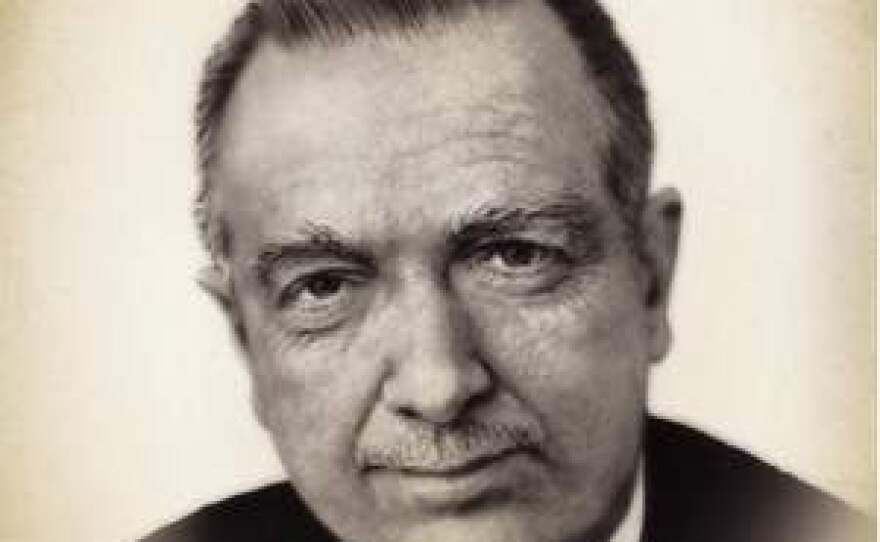Many knew him as the “most trusted man in America,” but how well do you really know Walter Cronkite?
Tuesday on Up to Date, Rice University History professor Douglas Brinkley talks about his new biography of Cronkite. Using material from the “Cronkite Archive” and over 200 interviews, including Andy Rooney, Leslie Stahl, Barbara Walters, Dan Rather, Brian Williams, Les Moonves, Christiane Amanpour, Katie Couric, Bob Schieffer, Ted Turner, Jimmy Buffett, and Morley Safer, Brinkley reveals a different side to the news anchor respected by millions.
HEAR MORE: Douglas Brinkley speaks this evening at 6:30 at the Kansas City Library Plaza Banch. The Library is anticipating a capacity crowd, but doors open at 6 p.m. Click here for more information.
Douglas Brinkley is a professor of history at Rice University and a contributing editor at Vanity Fair. The Chicago Tribune has dubbed him "America's new past master." Six of his books have been selected as New York Times Notable Books of the Year. His most recent book, The Great Deluge, won the Robert F. Kennedy Book Award. He lives in Texas with his wife and three children.
Excerpt from Cronkite, by Douglas Brinkley:
Of all Walter Cronkite’s boyhood adventures, the one that was seared in his memory clearest was his first airplane flight, in 1923. For the seven-year- old Cronkite the near-death episode ironically engendered a compulsion toward risky endeavors. He liked having his adrenal gland working in overdrive. In this pre-Lindbergh era, prop airplanes had been flown recreationally for only a decade. “My father and I went up in an old Curtiss-Wright bi-plane with an OX-5 engine in it off of a grass field in Kansas City,” Cronkite told David Friend, a reporter for Life magazine. “The engine failed just on take-off and the pilot put it down in a nearby field, running through a fence. Scared the devil outta Dad. I thought it was a great experience. Didn’t know any better.”
For Cronkite, the spectacular bird’s-eye view of the Show-Me State’s topography was an unforgettable thrill. In later years he enthusiastically recalled the flight over his birthplace of St. Joseph, perched along the Missouri River, and the clock tower at Union Station in downtown Kansas City jutting upward on the horizon like Oz. The perilous Curtiss-Wright flight was emblematic to Cronkite; it foreshadowed his intrepid career as a military aviation beat reporter for the United Press and CBS News. After admiring little Walter’s contained bravery on the near-disastrous flight, Walter Cronkite Sr.—his father—proudly called his only child “The Flying Dutchman.”
In The Story of My Life, Clarence Darrow bemoaned the fact that so many autobiographers and biographers “begin with ancestors” for the “purpose of linking themselves by blood and birth to some well-known family or personage.” But in Cronkite’s case, lineage mattered, for he always wanted to be associated with his Dutch (more so than his German) heritage. To the imaginative Cronkite, Dutch seafarers—libertarian, democratic, and worldly—were unflappable ocean explorers worthy of a Rijksmuseum full of Old Master oil portraits. One of the first educational documentaries Cronkite narrated after stepping down as CBS News anchorman in 1981 commemorated the bicentennial of America’s friendship and unbroken diplomatic relations with the Netherlands. Cronkite filmed the documentary at the regal Van Cortlandt Manor in suburban Croton-on-Hudson, New York. “We Dutch are a very pragmatic people,” Cronkite said at the film’s outset, “quick to seize on things that will benefit us. Yes, I did say we Dutch. You see, back in 1642, when this town of New York was called New Amsterdam, there was a fetching young maiden named Wyntje Theunis. In the pragmatic Dutch manner she was courted by a gallant lad named Hercks. Now Hercks knew a good thing when he saw it. He married Wyntje and bestowed on her his family name: Krankheidt.”
The future CBS newsman’s pride in his Dutch heritage, an inheritance from his father, was profound. On Thanksgiving Day, Cronkite Sr. would talk at length about how the Pilgrims sailed from Holland to Cape Cod looking for a place to worship God without religious persecution. While young Cronkite wasn’t taught to memorize all of America’s state capitals or the chronological order of the U.S. presidents by his parents, he proudly knew that the Vanderbilt, Rockefeller, and Roosevelt families were of noble Dutch stock.
Copyright © 2012 by Douglas Brinkley. Reprinted courtesy of Harper, an imprint of HarperCollins Publishers.






